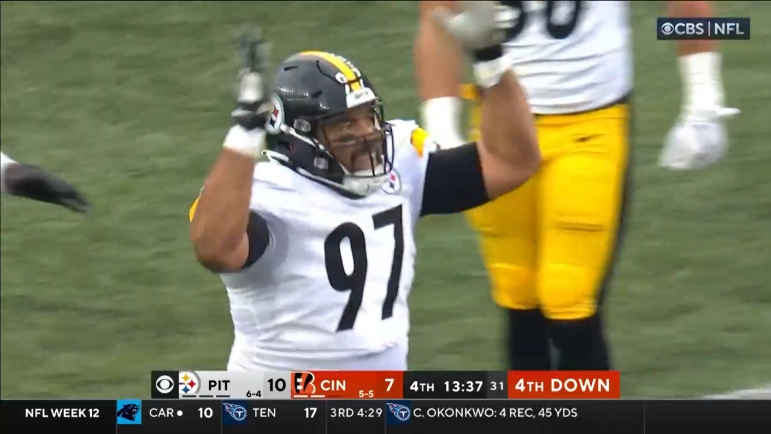Player: DL Cameron Heyward
Stock Value: Down
Reasoning: The veteran defensive lineman’s contract demands appear to be going nowhere fast. Heyward says he wants to play three more years, but the Steelers don’t seem eager to throw him more money. They may require him to prove he is still at the top of his game this year and look to potentially re-sign him later.
Cameron Heyward only spent two weeks with the Steelers during the spring. After skipping the first two weeks of OTAs, he showed up for the last week and then attended minicamp. Even while there, he surely did very little—nothing that can tell us what to expect during the season.
And that’s the biggest problem Heyward is facing right now because he wants a new contract extension. Unfortunately for him, it comes at an inopportune time following an off season due to injury. At 35 years old and coming off injury, how much do the Steelers want to commit to him?
So far, it doesn’t even sound as though Heyward is particularly optimistic anything will happen at all. I think we can determine that simply through the extremity of his actions, by his standards. Using his public platform to push his narrative, skipping OTAs, these are out of character for him. They speak to a player using any tool he can wield to push for what he wants against the odds.
Thirty-five-year-old defensive linemen essentially never receive lucrative contract extensions. Most who even make it that far are working on a year-by-year basis, but how many have had Cameron Heyward’s stability? He has played for the Steelers his entire career, and at a consistent level as a perennial Pro Bowler.
The injury of last season has been the only blemish since Heyward’s last and only other major injury in 2016. Between the two, he transformed himself into a dominant force, arguably a generational player. But what he has been is not necessarily what he will be from this point forward.
The good news for Heyward is that all he has to do is go out there and prove himself. He can still find his payday out there if he shows on the field that his performance still merits it.
As the season progresses, Steelers players’ stocks rise and fall. The nature of the evaluation differs with the time of year, with in-season considerations being more often short-term. Considerations in the offseason often have broader implications, particularly when players lose their jobs, or the team signs someone. This time of year is full of transactions, whether minor or major.
A bad game, a new contract, an injury, a promotion—any number of things affect a player’s value. Think of it as a stock on the market, based on speculation. You’ll feel better about a player after a good game, or worse after a bad one. Some stock updates are minor, while others are likely to be quite drastic, so bear in mind the degree. I’ll do my best to explain the nature of that in the reasoning section of each column.








